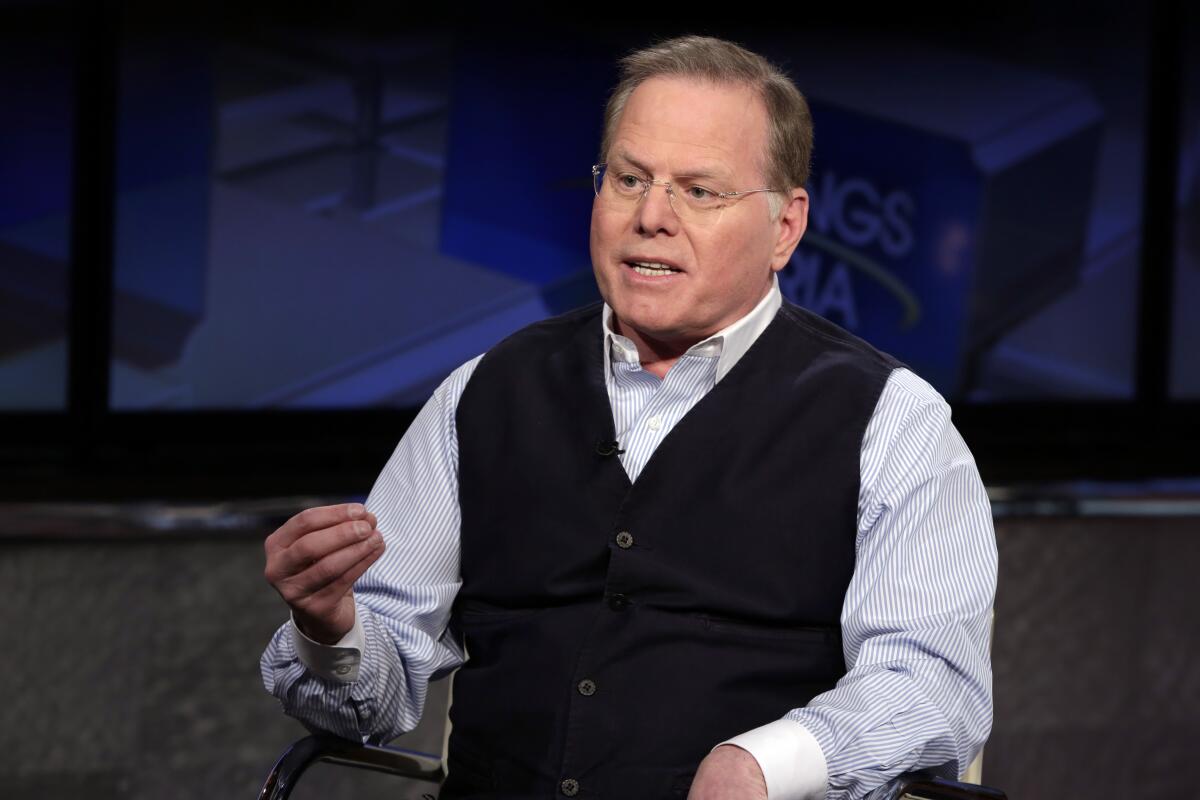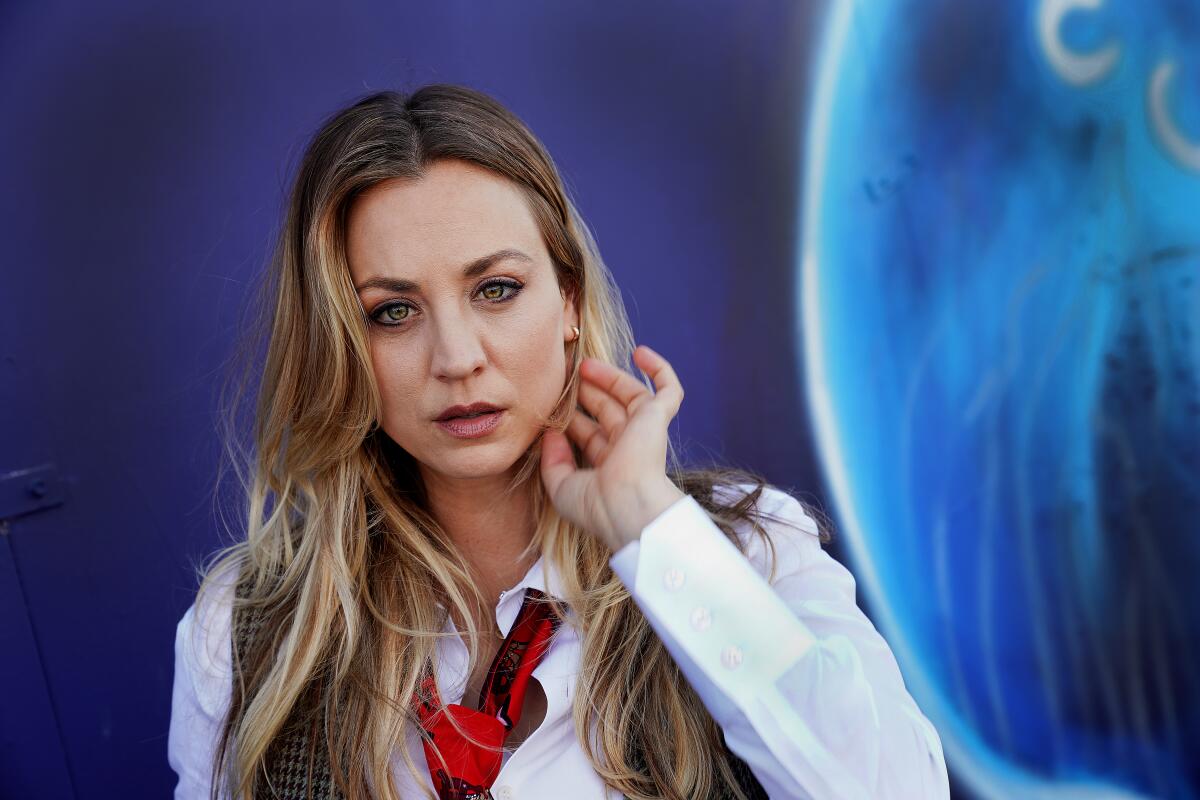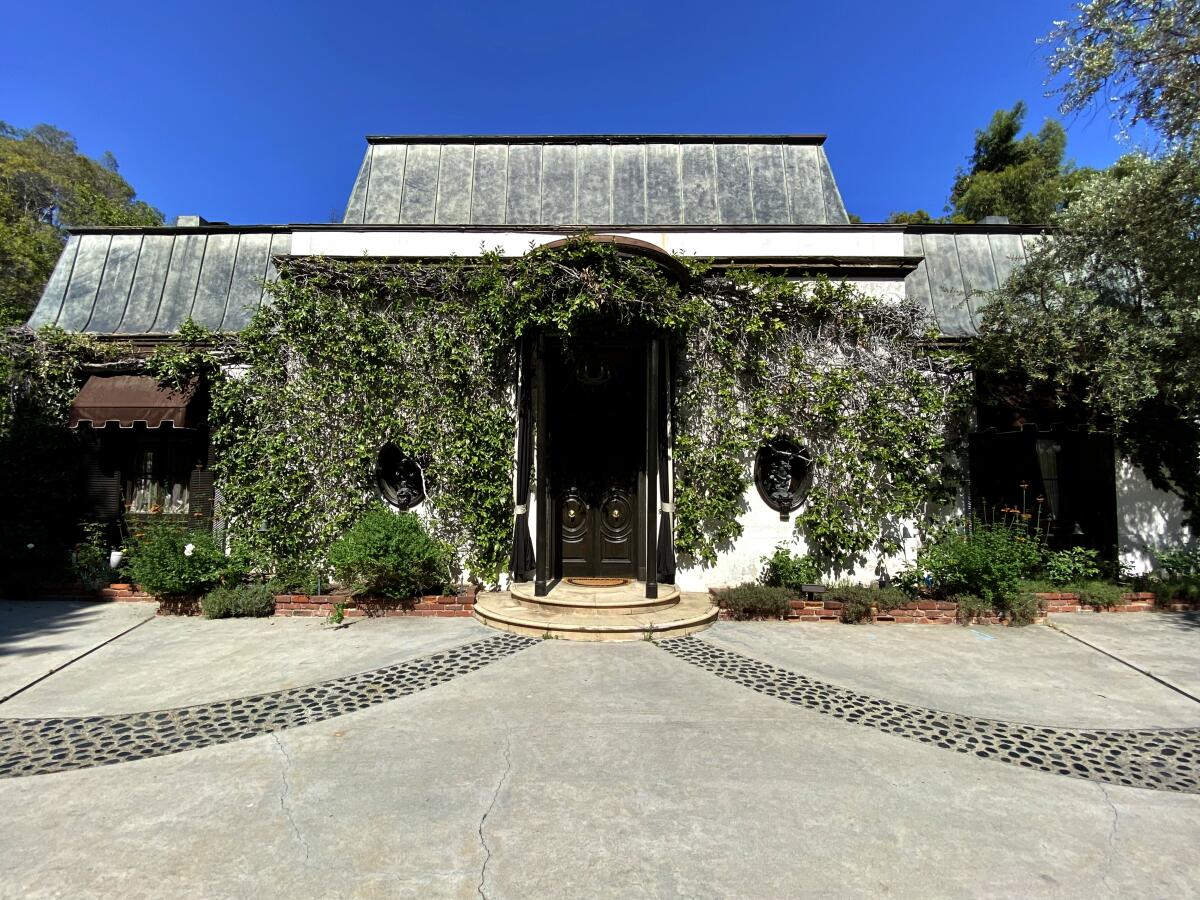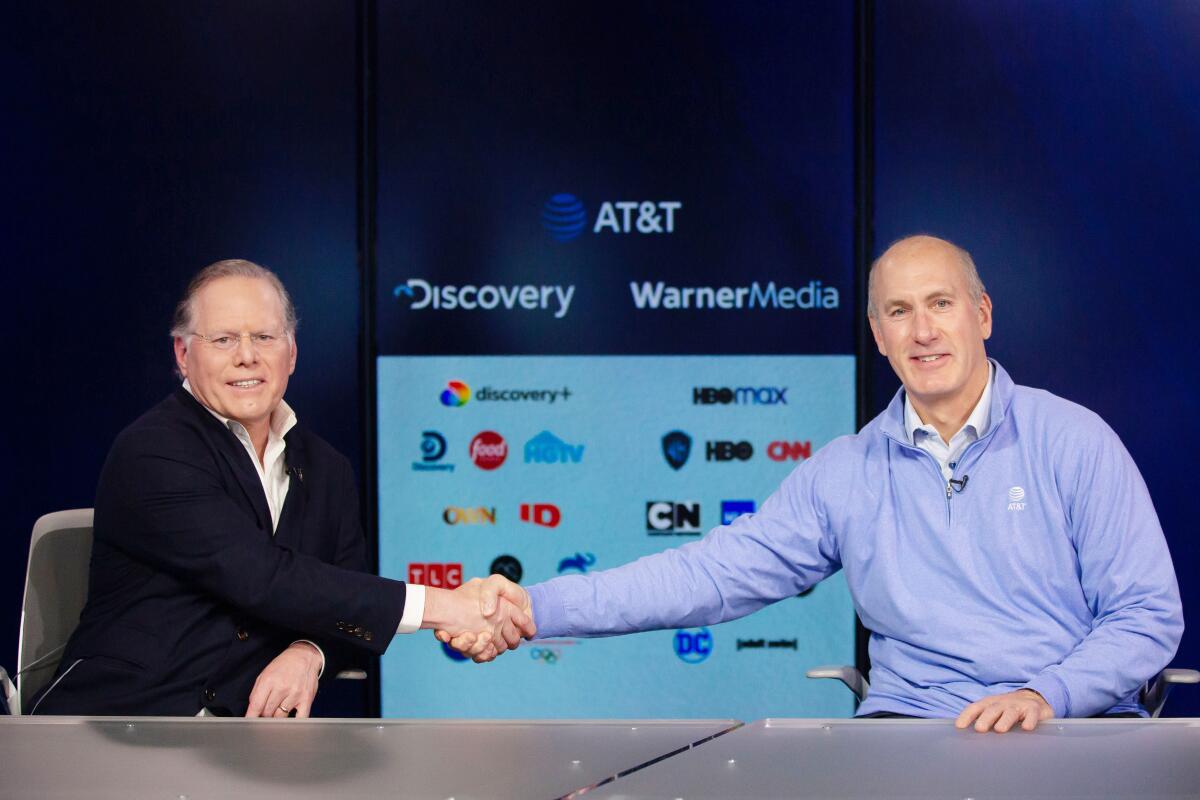With Discovery merger, can David Zaslav restore Warner Bros. to its former glory?

- Share via
Discovery Inc. Chief Executive David Zaslav revealed his penchant for Hollywood nostalgia two years ago, buying the Beverly Hills home of the late movie producer Robert Evans.
There, Evans green-lit such classics as “The Godfather” and “Chinatown” and hosted raging parties for the likes of Jack Nicholson, Warren Beatty and Ali MacGraw. But the shrine to the halcyon days of movie-making was in decay. Statues were cracked and toppled, vegetation ran wild and the pool house had long ago burned down.
Undeterred, Zaslav paid $16 million for the 1.3-acre estate and plunged into a two-plus-year renovation.
Now Zaslav is embarking on a much bigger and more challenging restoration: Bringing WarnerMedia and its Burbank studio back to former glory after nearly four years of AT&T ownership.
Cable programming giant Discovery on Friday completed its $43-billion takeover of WarnerMedia from the Dallas telecommunications firm, creating one of the world’s largest entertainment companies, Warner Bros. Discovery Inc.
The marriage combines WarnerMedia’s premium assets, including HBO, CNN, Cartoon Network, TBS, TNT and the Warner Bros. studio, with Discovery’s mainstream channels, Food Network, HGTV, Animal Planet, TLC and Investigation Discovery, among others. The new entity — which will be based in New York and Los Angeles — will boast nearly 40,000 employees and more than $50 billion a year in revenue by 2023.
The deal marks the fourth major consolidation in Hollywood in three years as legacy media companies adapt to the streaming revolution. It follows Walt Disney Co.’s takeover of much of Rupert Murdoch’s 21st Century Fox; Viacom’s merger with CBS Corp.; and Amazon’s $8.5-billion purchase last month of the historic MGM studio.
Their businesses have been roiled by Netflix, Amazon and Apple, which spend freely to buy TV shows and movies for their streaming services.
“Zaslav’s competition is truly trillion-dollar companies,” said Jeff Cole, director of the USC Annenberg School for Communication’s Center for the Digital Future. “And the competition is only going to intensify.”

For the ambitious 62-year-old media titan, success is not a sure thing.
Zaslav must navigate the shift to streaming while melding two dramatically different corporate cultures and identities. He must strike a balance by continuing the path set by AT&T to focus heavily on streaming, but also stretch the life span of its existing businesses that have long produced major profits, including big-budget movies and cable TV channels.
Warner executives have prided themselves on creating prestige television, such as HBO’s “Succession” and “Euphoria,” and epic movies including “Batman v. Superman” and “The Matrix.”
By contrast, Discovery’s popular fare is nonfiction and lower-budget : Think “90 Day Fiancé,” “Property Brothers” and “Diners, Drive-Ins and Dives.”
WarnerMedia veterans have been bracing for a culture clash in a company that has had four CEOs in four years.
Earlier this week, Zaslav announced that most divisions will be run by his lieutenants from the much smaller Discovery. Only HBO content, Warner Bros. motion pictures and television, and the international group will continue to be led by Warner executives. A Discovery team will take over the HBO Max streaming service.
“People have already endured four years of change,” said one WarnerMedia insider who was not authorized to comment. “They’re tired, and tired of wondering who their next boss will be.”
The deal will leave Discovery with about $55 billion in debt. Zaslav has promised Wall Street that combining the two companies will generate at least $3 billion in cost savings, putting heavy pressure on him to make dramatic cuts. Analysts expect there will be hundreds of layoffs.
Industry observers expect the company to combine the support staff for the two streaming services, Discovery+ and HBO Max, and pare the ranks of executives who oversee the domestic cable TV channels. WarnerMedia CEO Jason Kilar and his top lieutenants departed this week.
But the cost-cutting could hinder Zaslav’s ability to pour more money into HBO and Warner Bros. to bolster its pipeline of programming and better compete against Netflix, Disney and Amazon.
“They need a lot more content, and they need to spend a lot more money to be competitive,” said one top Hollywood agent who was not authorized to comment publicly.

Another thorny matter: Zaslav and his new team must settle on a film release strategy after Kilar’s highly unpopular decision to release Warner Bros. movies in 2021 directly to the HBO Max streaming service the same day they arrived in theaters. (Warner Bros. has said it is releasing about half of its movies this year exclusively in theaters for 45 days, before moving to HBO Max.)
AT&T executives credit the “day-and-date” release strategy, in part, for giving HBO Max its most-watched month ever in December, and enabling the nearly 2-year-old streaming service to finish 2021 with nearly 74 million subscribers.
“The day-and-date strategy wasn’t that much of a win because the cost was enormous,” said media analyst Michael Nathanson of the MoffettNathanson firm. “But it was helpful to rethink the theatrical window and they get credit for that.”
Warner Bros. was forced to make big payouts — a total of more than $200 million — to movie producers and talent who were furious that the simultaneous HBO Max launches depressed ticket sales for their movies. The studio lost one of its most prominent directors, Christopher Nolan, who went across town to Universal Pictures.
“They sold out their producers, with the day-and-date releases, because they had botched the HBO Max launch,” Cole said.
Zaslav will be challenged to find ways to best maximize the theatrical run for Warner Bros. movies while strengthening HBO Max.
The company also must try to extend the life of its linear cable channels, which produce huge profits, at a time when cord-cutting continues.
“Where do the Turner networks, TBS and TNT, fit in with the company’s long-term strategy?” Nathanson asked. “The content they offer — movies and syndication — is better served on streaming. Long term, these are challenged assets.”
Zaslav must grapple with the high costs of sports rights for the Turner channels. The company’s deal with the NBA faces a renewal in a couple of years, Nathanson said, adding: “How do they think about sports going to streaming?”

Beyond integrating the two companies and charting strategy, Zaslav probably will face additional scrutiny.
Until now, Zaslav reported to controlling shareholders — cable pioneer John Malone and the Advance/Newhouse media company. The insular structure provided Zaslav with latitude to focus on his initiatives, including international expansion. He also benefited by regularly receiving one of the most generous compensation packages in America. He received a $246.6-million package in 2021 boosted by his role orchestrating the merger.
But the new company doesn’t have preferred stock or controlling shareholders. At launch, AT&T investors will own 70% of the stock of Warner Bros. Discovery.
Already, there was an outcry over the makeup of the new company’s 13-member board. AT&T named five people of color to the panel, but Discovery named six white men, including Zaslav, Malone, and Steven O. Newhouse and Steven A. Miron, who represent the Advance/Newhouse Partnership, which owns more than 8% of the new entity.
No Latinos were named to the board, prompting a swift push-back from the National Hispanic Media Coalition, composed of Latino advocacy groups. Zaslav’s executive team, unveiled this week, includes few people of color.
“He’s been in the entertainment business for such a long time. Why doesn’t he have connections with Latino executives that he could have brought onto his management team?” the group’s president, Brenda Castillo, asked this week. “This raises deep concerns about how Latinos are hired, treated and portrayed by Warner Bros. Discovery in their content.”

For AT&T, the sale represents a humbling retreat from the company’s big Hollywood ambitions.
On Friday, AT&T Chief Executive John Stankey — who ran WarnerMedia from June 2018 to May 2020 — sent an email to WarnerMedia employees, commending them for “leading this remarkable evolution through some of the most unprecedented times we have ever seen in the company, industry and world.”
Analysts credit AT&T for recognizing the urgency of the company’s need to embrace the streaming model.
But the company decided to abandon its entertainment holdings three years after spending $85 billion to buy WarnerMedia.
“Getting to this moment was one of the more difficult decisions of my life,” Stankey wrote Friday. “I remain confident we have set the right path. Over time, the combination of WarnerMedia and Discovery will bring forth a stronger company and quicken the already strong pace of innovation and change you have established.”
Many in Hollywood are enthusiastic for the arrival of Zaslav, who is known as an energetic, decisive and hands-on manager.
The Brooklyn native joined NBC more than 30 years ago as a lawyer in its cable programming group. Discovery hired him as its CEO in 2007, and he transformed the company from mid-tier player to one with operations across the globe.
“International is where the opportunity is,” Nathanson said. “Discovery has boots on the ground internationally, and that could help expand HBO Max. Discovery has an advantage over almost everyone else, internationally.”
Zaslav, who plans to move into his Beverly Hills home when the remodel is finished, has been calling on Hollywood’s power players. In a company town hall last year, Zaslav spoke of his reverence for Warner Bros. films, saying “The Maltese Falcon” was one of his favorites. He borrowed a pivotal line from the film, “the stuff that dreams are made of,” as a catchphrase for the company.
“He truly does care about entertainment, and he truly cares about Hollywood,” said Chris Silbermann, head of ICM Partners. “He has great respect for the history of Hollywood.”
More to Read
Inside the business of entertainment
The Wide Shot brings you news, analysis and insights on everything from streaming wars to production — and what it all means for the future.
You may occasionally receive promotional content from the Los Angeles Times.











